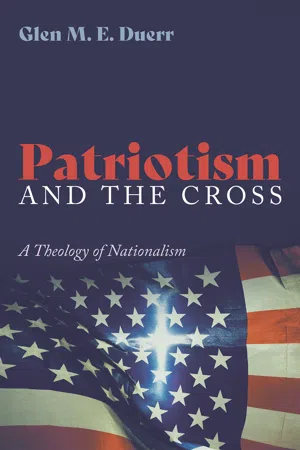![]()
Chapter 1
Introduction: Patriotism and the Cross
Jesus said to him, “I am the way, and the truth, and the life; no one comes to the Father but through me. If you had known Me, you would have known My Father also; from now on you know Him, and have seen Him.”
—John 14:6–7
Imagine, for a minute, a conversation between Peter, Mary Magdalene, Augustine of Hippo, Thomas Aquinas, Martin and Katharina Luther, Billy and Ruth Graham, and twenty-first century church leaders in Brazil, Nigeria, and South Korea, on Scripture and questions of God. The conversation, one could imagine would be rich in theological depth, but also fascinating in terms of the comparison of traversing time and space wherein, for example, a first century friend of Jesus (Peter or Mary) interacts with a sixteenth century pastor (Martin Luther). How did Christians, for example, at a specific point in time publicly identify their Christianity with one another?
It would be instructive to ask personal questions of Peter about Jesus’s ministry, peering in to the Sea of Galilee from a beach on its shores to look at multicolored fish, or watching the myriad birds flying behind Christ as he delivered the Sermon on the Mount. Likewise, to hear a personal account from Martin Luther on the Holy Roman Empire (HRE) and its reach across much of Western and Central Europe, as connected to small parishes like Eiselben (Luther’s hometown). Hearing the reaction of some of the early church leaders to an update on life and society, especially technology, from the twenty-first century would also be fascinating, especially for Augustine to hear of the Bible being translated into thousands of languages and disseminated to people all around the world—far beyond the extents of the known world in the fourth century. Yet, his insightful dichotomy of the differences between earthly and heavenly cities remain apropos for Christians almost 1600 years after its publication in 426.
Such a conversation would allow the viewer/listener to see and hear issues within the church over time and to compare controversies of theology. An added component of this hypothetical conversation, though, would also have to include geography and issues of nationality. Peter, originally from Bethsaida (John 1:44) or Capernaum (Matthew 8:14), talking with Augustine from Numidia (modern day Algeria), speaking with Aquinas from Italy communicating with Martin and Katharina Luther from Germany. Throughout the timeline of the church, nationality and place are factors in the sharing and movement of the Christian faith. In the twenty-first century, the gospel has been spread throughout the world, to the ends of the earth, and translated into hundreds of languages. Rather than being a potential stumbling block between Christians, or a Christian sharing the gospel with someone, issues of nationality should be discussed.
What does the Bible teach about issues of nationality, nationalism, and patriotism? The question matters because even though all humans are unified as descendants of Adam, the world is divided into numerous nations, states, and ethnic groups. The above is a perplexing, multifaceted question. In general, most people have a sense of what these terms—nationality, nationalism, and patriotism—connote, but the application is often narrow, and the application of these concepts are used to fit their own lives in a general, non-encompassing way. One of the central goals of this work is to avoid asserting positions without defining what is meant, or narrowly applying them to one’s own circumstance but not others. This is an impossible task, but the final goal is to write a book that is accessible to as many people as possible in a variety of differing circumstances. This work extends field of nationalism to also encapsulate concepts such as multiple national identities, Supranationalism, secession, and transnationalism, which increasingly affect the lives of Christians in the twenty-first century.
As an example, this book examines supranational organizations (also known as multilateral free trade blocs) such as the European Union (EU) or Mercosur in South America (in English, known as the Southern Common Market) increasingly dictate how people live, including Christians, in member states in Europe and South America respectively. These supranational trade blocs add a layer of governance that exists in addition to national and local governments. Organizations like the EU have power over the food people eat and the air they breathe through regulations; a Belgian chocolatier is equally at the mercy of bureaucrats in Brussels who provide technical guidelines on her list of ingredients as she is to tourists from New York or Lagos or Beijing who buy her chocolates. These supranational organizations also contribute to new ways of thinking about land and space. For example, the average Christian in Germany may be concurrently connected to the southeastern Länder (the equivalent of a state/region/province) of Bavaria, the country of Germany, and Europe through the EU. Each layer of government (region, Country, and EU) may entice a person to form a strong layer of geographic attachment gluing the person to specific parts of the land.
Another component of this book involves Christians who find themselves living in regions with active secessionist movements, such as, for example, Flanders in northern Belgium, or West Papua in Indonesia. This situation raises an important question: at what point should a Christian rebel—in the case of secessionism, agains...
